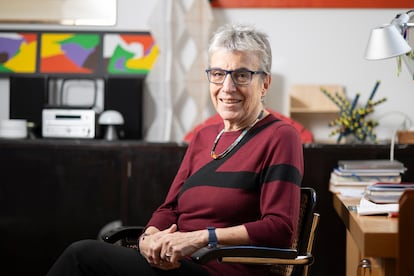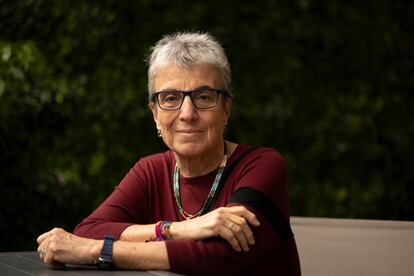Anna Freixas, psychologist: ‘It is very difficult to be young and approach menopause with a relaxed view of a natural process’
The retired university professor has reissued a book in which she attacks the notion of this life stage as an illness and dismantles stigmas and taboos

There is life beyond menopause. And “good life,” the feminist psychologist Anna Freixas adds. The retired professor of Psychology has just updated her book Nuestra menopausia: una versión no oficial (Our Menopause: an unofficial version) 17 years after its original publication, in which she sets out her critical view of the sociocultural perception of this stage of life and dismantles myths, stigmas, and taboos.
Freixas rails against the notion that this life stage is an illness and is scathing about menopausal hormone therapy (MHT). The drugs have been plagued by controversy for decades because they were recommended to all women on a massive scale. Then, at the beginning of the century, it was discovered that they increased the risk of certain diseases. In Spain today, clinical guidelines limit MHT’s use to a specific profile of women and with severe vasomotor symptoms, but Freixas still has misgivings. The psychologist, who defines herself as “a curious person and a bothersome thinker about the life cycle of women,” highlights the need to “talk” about menopause, whether in the past, present, or future.
Question. This book is an update of the one you published in 2007. Have things changed much since then?
Answer. Things haven’t changed that much. The heart of the matter remains the same. There is a cultural panic that is transmitted to women. And this cultural panic is the mother of all controversies and is responsible for all the fears women have about menopause.
Q. Is it a cultural panic about menopause or what we expect from it?
A. It is a cultural panic stemming from what you are told about a process that is natural and normal. It is very difficult to be young and approach menopause calmly, secure in themselves, and with a relaxed view of a natural process, such as menarche [first menstrual bleeding].
Q. How has this panic been built?
A. It comes from afar. Culturally there has been a definition of women as beings for reproduction, a womb with legs. The thing is that that definition doesn’t work for us now. In our culture, women do not have children, or have very few, and our raison d’être is not reproduction. Furthermore, we are living much longer. We have menopause at 50 and we die at 90. The 40 years from 50 to 90 are almost more significant than the previous 40. We cannot think that half of our life is meaningless.
Q. Is menopause still a taboo?
A. In the time between publishing one book and the other, I think we have made progress in this aspect. In the same way that menstruation is also talked about, menopause is now also beginning to be a topic of conversation. Women have acquired greater freedom, more security, and less panic. The taboo is based on the fear of exclusion: the fear that, after menopause, you will no longer be sexually eligible, you will stop being attractive, lose positions in the labor market, and so on.
Q. In the book you say that language is not innocent. You suggest talking about signs instead of symptoms. Why is that?
A. Symptoms indicate illness. Hot flashes are not a symptom of menopause; they are a sign, a signal. When we confuse sign and symptom, we are agreeing with those who consider menopause to be a hormone deficiency disease. It is not a disease, it is a natural process. It cannot be that the end of the reproductive cycle is the most important thing that happens in our lives.
Q. Another phrase of yours: “We are not sick, but wounded by the social stigmatization of this transition.” How do we heal these wounds?
A. It is very important to talk with other women: our mothers, our friends, and our sisters. Talk and read. And realize that for many women menopause means nothing. And many will tell you: “I feel freer, better, less emotionally vulnerable, more in control of myself, and I have much more energy.”
Q. Are there signs that do not directly fit this biological process that are attributed to menopause?
A. Of course. There are currents in gynecology that say that there are up to 80 signs that can be attributed to menopause. Please! What does that mean? Is losing an eyelash a sign that you lack estrogen? As Carmen Sáez Buenaventura says: like a beautiful cape, menopause covers everything.
Q. But there are vasomotor symptoms, such as hot flashes or night sweats, that have a physiological explanation linked to this hormonal decrease. And there are women who suffer from them. They are real. It is not a somatization due to the sociocultural context.
A. Obviously. These signs are real, but they affect a small percentage of women, which is not to say that they are not important. There are many women who do not have a single hot flash and there are other women who have many and very significant ones. Obviously, hot flashes are real and very annoying, but they last for a while, then they go away. And they are not only due to estrogen: they are also due to stress, the quality and type of life we lead. It is a question of hormones stimulated by a living situation.

Q. Can we compare the notions of menopause and menstruation? While menstruation is socially accepted because it implies “becoming a woman,” menopause is quite the opposite. But menstruation also has negative connotations, such as assuming that a woman is “on her period” when she is in a bad mood.
A. The thing is that women always have an exposed flank. Culturally, we have been attacked for our biology, for having periods, and for not having them. The patriarchy has used this to discredit women. This lucidity of women throughout life, which is rooted in our being a woman, in our logic that has to do with the essence of the creation of life, is unbearable for society and must be attacked.
Q. Is menopause pathologized?
A. Yes, totally. But I also think that, in the last 20 years, menopausal pride is beginning to appear. That is, women who stomp their feet and say: “Yes, I am happy since I have had menopause. I feel better.”
Q. You are very critical of MHT. But, currently, in Spain, its use is very limited to very specific cases. What do you think?
A. What you say is perfect: limited by this, that, and the other. But I’m afraid it doesn’t happen that way. Why do I say that? Because I hear young gynecologists talk about the 80 symptoms and that MHT is not what it used to be, or that it is preventive. And I find it hard to believe it. I agree that in some cases it may be necessary. I am not a doctor, and nor do I want to be, but I am afraid that this clear reflection does not exist.
Q. There are gynecologists who suggest that there is a certain “hormonophobia” in Spain.
A. It’s not hormonophobia, it’s that in Spain there are clear-thinking women who do not accept what they [the patriarchy] have tried to do to us. The thing is that they should be asking for forgiveness for the abuses that have been committed and for the amount of lies and fears that we have been subjected to. What worries me most is the fear that young women harbor in their bodies for years, meaning that they reach menopause full of panic. That is very serious.
Q. Just as it was a mistake to make us believe that periods had to hurt no matter what — which could mask undiagnosed cases of endometriosis — couldn’t normalizing any of those 80 signs I mentioned as part of the vital process also hide a pathological condition?
A. The signs that are really associated are hot flashes, vaginal dryness (which also has a lot to do with desire), and some women’s decrease in sexual interest, but which also has to do with the relationship situation, and little more. There is a series of gynecological examinations that are routinely done and whose objective is to rule out other types of problems.
Q. You talk about the “menopause industry.” Who are they?
A. They are the entire set of economic forces that induce us to consume certain products in order to avoid something that has not yet occurred or an inconvenience that may never exist. And they also induce a fear in us. They define menopause as a disease, and promise what they cannot deliver. They make us sick and they ruin us.
Q. What are the biggest fears that women have around menopause?
A. The exclusion: work, sexual, and emotional. When they want to scare you, they warn you that menopause is the beginning of the end. How can it be the beginning of the end when we are at the beginning of new life? We are in our 50s, we are going to live another 40 years of meaningful life.
Q. You highlight the positive opportunities from this vital process, but each menopause is different, and each woman experiences it differently. Can excessive euphoria about what this stage of life can offer distort this diverse reality?
A. Menopause is a stage in the long life cycle. I don’t think it’s something that should be given tragic importance. It is a process in the life cycle that for some women gives certain meanings, and causes others some difficulties.
Sign up for our weekly newsletter to get more English-language news coverage from EL PAÍS USA Edition
Tu suscripción se está usando en otro dispositivo
¿Quieres añadir otro usuario a tu suscripción?
Si continúas leyendo en este dispositivo, no se podrá leer en el otro.
FlechaTu suscripción se está usando en otro dispositivo y solo puedes acceder a EL PAÍS desde un dispositivo a la vez.
Si quieres compartir tu cuenta, cambia tu suscripción a la modalidad Premium, así podrás añadir otro usuario. Cada uno accederá con su propia cuenta de email, lo que os permitirá personalizar vuestra experiencia en EL PAÍS.
¿Tienes una suscripción de empresa? Accede aquí para contratar más cuentas.
En el caso de no saber quién está usando tu cuenta, te recomendamos cambiar tu contraseña aquí.
Si decides continuar compartiendo tu cuenta, este mensaje se mostrará en tu dispositivo y en el de la otra persona que está usando tu cuenta de forma indefinida, afectando a tu experiencia de lectura. Puedes consultar aquí los términos y condiciones de la suscripción digital.









































